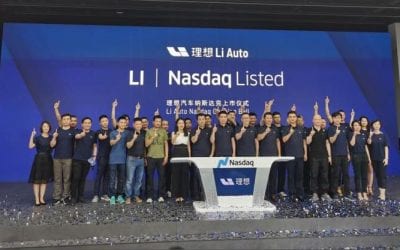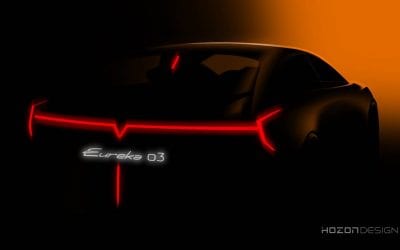
Apollo Electric Vehicles
|
wattEV2buy explore the BAIDU Autonomous Electric Car Strategy and list
the BAIDU A-EV Models, news, and sales as it vies for a position in the
EV market. |
Apollo Electric Car Strategy in the news
Week 31 2018 Apollo self-driving contribute to BAIDU profits
China’s Google, Baidu, announced that its Q2 revenues jumped 32% contributing resulting in a jump in net profits by 31%. Robin Li, Baidu’s CEO, highlighted its self-driving program Apollo’s contribution to the successful quarter. Apollo has signed 119 OEMs and parts suppliers including Daimler and BMW to its open source platform. We reported in Week 27 that Apollo started producing its first Level 4 autonomous vehicle the Apolong transporter.
In May Baidu, Lifan and EV rental company Pand-Auto started testing China’s first shared self-driving pilot program in the municipal area of Chongqing.

Week 30 2018 Daimler and BAIDU signs A-EV MOU
Daimler and Baidu
signed a Memorandum of Understanding to expand partnership through the
Apollo autonomous driving platform and to integrate Baidu’s vehicle
connectivity services into Mercedes-Benz infotainment system MBUX.
Week 28 2018 BAIDU enters into more MOUs
Hyundai and Baidu announced the signing of a memorandum of understanding (MOU) for Internet of Vehicles (IoV) services this week. According to the MOU the partners will co-develop connected car service that provides a wide range of in-car content based on big data, maps, AI, and portal services. Hyundai Motor Group will embed Baidu’s Xiaodu In-Car OS in its production cars and jointly advance in-vehicle voice recognition services based on Baidu’s natural language processing and Hyundai’s noise cancellation technologies.
BMW joined Chinese tech-giant Baidu’s opensource autonomous driving platform, Apollo. BMW will be a board member on the Apollo program.

Week 27 2018 BAIDU starts production of self-driving transporter
Nasdaq listed Baidu and commercial vehicle manufacturer FJ Motor started
production of the first mass-produced autonomous transporter, the
Apolong. Baidu, the largest search engine in China, and King Long
started working on the Apolong
in late 2017. The developed was managed by Baidu’s Apollo unit, created
to spearhead the company’s autonomous vehicle program, in the same
fashion as Waymo was created by Google. The Apolong can carry 14
passengers, eight seating, and six standing. The Apolong is
equipped with the Apollo 3.0 autonomous system allowing for Level 4
self-driving and has no steering wheel. The assembly plant is at FJ
Motor’s King Long unit in Xiamen, Fujian province has produced 100 units
of the autonomous minibus to date. Baidu will start exporting the
Apolong to Japan in 2019 in conjunction with Japanese company Softbank
where the vehicle will be deployed as shuttle buses for the elderly and
staff at Nuclear plants. Although Leve 4 autonomy is not fully
autonomous, it does allow the operation of a vehicle within an enclosed
location without a human driver.

Week 15 2018 BAIDU and GWM sign MOU
Chinese tech company, Baidu (or China’s Google as its known in the west) signed an MOU with Great Wall Motors
collaborate in four major areas, namely intelligent-connected vehicles
(ICVs), autonomous drive, ride sharing and big data. The MOU will be the
two companies second collaboration, following the 2016 agreement where
they joined forces on the development of map positioning technology. The
latest MOU will see GWM’s i-Pilot self-driving system connect with
Baidu’s Apollo autonomous driving platform which will see GWM models
with Level 3 autonomy on Chinese roads from 2020.
Week 39 2017 BAIDU raises funds for A-EV program
Baidu, China’s
equivalent of Google and early entrant to self-driving cars raised
$1.49 Bln (9.8 billion yuan) fund to develop self-driving cars. The
Apollo Fund, as it is named, will invest in 100 autonomous projects over
the next three years. The fund shares the same name as the search
engines open source autonomous software. Version 1.5 of Apollo was
released at the same time as the launch of the fund.
Week 36 2017 BAIDU and JAC formalizes A-EV program
The Chinese automaker, JAC and China’s Google, BAIDU, this week announced a partnership to develop a Level 3 mass market self-driving car for production in 2019, year after Audi will
produce a level 3 capable Audi A8. Baidu launched its autonomous
strategy, called Apollo, two months back. The Apollo strategy mimics
that of Google, aiming to develop software for autonomous vehicles.
Hardware partners to the Apollo program include Bosch. It’s still
unclear how the strategic partners will develop the vehicle as testing
of autonomous cars is not yet legal on Chinese roads. Baidu, however, has a permit to test autonomous cars on Californian roads. Other automakers, such as Volvo and Ford are targeting Level 4 autonomous vehicles by 2021.
Top 5 EV News Week 32 2020
Top 5 EV News Week 32 2020 | Cadillac Lyriq unveiled. Yet another Chinese EV startup IPO. Three new EV models launched this week.
Top 5 EV News Week 31 2020
Top 5 EV News Week 31 2020 | Successful IPO for CHJ Auto, Kandi finally enters the USA, Mitsubishi pays the cost for failing EV strategy.
Top 5 EV News Week 30 2020
Top 5 EV News Week 30 2020 | Chengdu Auto Show, Hozon Neta IPO, VW invest in China, eVito Tourer for sale









